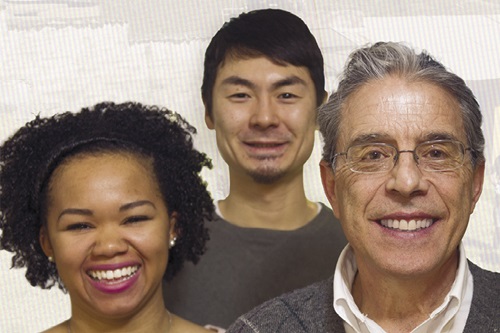“Peru is going to be your classroom and Peruvians are going to be your teachers. Everything you see, everything you hear, everywhere you go is a lesson. So we need to keep our eyes open, our ears open, and use all of our senses to absorb all of the experience.”
This is the charge that Department of Politics and Government Professor Carlos Parodi gives each of the students chosen to accompany him to Peru for the Maria Elena Moyano Seminar. The annual seminar, which Parodi created in 2006, is a month-long exploration of human rights and community development in Peru named in honor of Maria Elena Moyano, a Peruvian activist who was murdered by the radical Communist Shining Path organization in 1992. During the 30-day experience, students interact with government officials, community leaders, organizations, and Peruvian citizens from all socioeconomic classes across the nation to participate in human rights programs and understand the politics, economy, and history of the nation.
Parodi, who was raised in Peru and returns several times annually, invites 10–15 students only after they have participated in individual interviews with him to assess whether they would be a good fit for the group. Since the trip takes students up mountains, along the coast, and even in the Peruvian jungle, he needs students to be physically fit and mentally ready for the long, rigorous days. In addition, students must agree to his firm “no complaining” policy to ensure that the group dynamic and close living quarters do not become complicated. Finally, he looks for a genuine interest in human rights.
“We are going to be practicing human rights,” Parodi said. “Students who come need to be willing to live out the principles of the Universal Declaration of Human Rights.”
The mandate demands more than attending lectures. Students must have a willingness to work toward building positive relationships with Peruvians and contributing to the development of the nation. Students engage citizens through socio-drama performances demonstrating the methodology they will be using to research development issues in Peru, working with peasants in a remote village, on a mural depicting the future of the village, and compiling all of their observations in a final report.
“Everything we find—we give it back to Peruvians,” he said, adding that the projects allow the group not only to work together as a research team, but also to break down cultural barriers and better engage with their native hosts.
Tony Pierucci, M.S. ’14, went to Peru in 2014. His group completed a community development project, which proved to be an effective way to learn about the culture and connect with Peruvians on a personal level.
“We collected data, and it was a way of having a cross cultural exchange at the same time,” Pierucci said. “The data we were collecting were not numbers, they were conversations.”
Information was compiled into a 40-page report that included a SWOT analysis of community development methods in Lima, as well as additional questions that community organizations and officials can consider as they plan for the continuing development of Peru.
Christina Pierce, a psychology major and criminal justice minor who also went on the 2014 trip, became interested in the seminar after realizing the focus on human rights would be a strong fit for her fields of study. As the only undergraduate student in the group, she found the experience to be transformational and took advantage of her travel companions and Parodi to learn more about graduate programs and their experiences.
“It was not a normal study abroad trip at all,” Pierce said. “I had the opportunity to learn more about myself, which helped me in deciding my career aspirations. During our stay, Dr. Parodi planned numerous excursions so we could discover the diversity of Peru. He planned the trip in a way that these experiences helped us to learn Peru’s history, culture, politics, and educational system.”
Parodi will be taking his 8th group to Peru June 3–July 3. He will begin seeking candidates for the 2016 trip in the fall.



